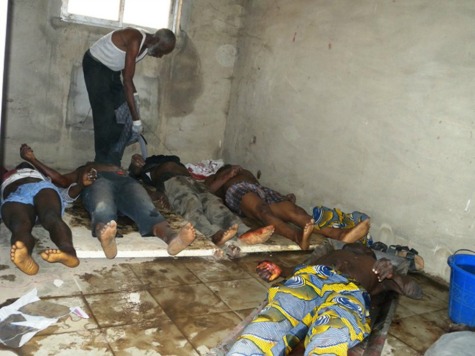
Experts at the Council on Foreign Relations, led by former U.S. Ambassador to Nigeria John Campbell, have been using media reports to track the number of political or religious deaths in Nigeria since 2011. Their research exposes the alarming speed at which Boko Haram established its reign of terror and how it continues to spread.
The Nigeria Security Tracker follows deaths that can be attributable to a terror group or tensions between ethnic, political, or religious groups. While the tracker does follow all varieties of this sort of violence, its findings suggest that Boko Haram is far and away the most dangerous group conducting these deadly activities. The group, which has existed in its current state under leader Abubakar Shekau since 2009, is to blame for a great number of these deaths.
When announcing the tracker in 2012, the Council on Foreign Relations noted that Boko Haram was also responsible indirectly for a number of deaths thanks to inefficient attempts by the Nigerian government to fight them. “Government soldiers have been indiscriminate in their fight against Boko Haram, often killing innocent civilians,” noted Campbell. “Police across the country are notorious for extrajudicial murder. Violent clashes between ethnic or occupational groups at times appear indicative of a deeper conflict between Christians and Muslims.”
At the time, the U.S. Department of State under Hillary Clinton refused to add Boko Haram to a list of terror organizations, despite the number of attacks already attributable to the radical Islamist group.
The organizers of the study say that the data used for the various graphics organizing the information “are based on weekly surveys of Nigerian and international media and focus on violent incidents directed at government property, places of worship, and suicide bombings.” The tracker does not follow robberies, sexual crimes, or crimes that do not result in death. The mass abduction of more than 200 schoolgirls in Chibok, Borno, for example, is not an event that the tracker would use as data.
The tracker has found that Boko Haram is responsible for more than 4,000 deaths in 2014.
Speaking to The Atlantic’s Uri Friedman this week, Campbell explained that his project came to be as a product of his “frustration over the imprecision about how many people were being killed, where it was happening, and the extent to which it was political versus criminal.” Given Nigeria’s “progressive breakdown of law and order,” he notes that it is especially important to distinguish between sheer criminal activity and criminal activity that is organized or fueled by some political or religious conviction.
Explore the Council on Foreign Relations Nigeria Security Tracker here.

COMMENTS
Please let us know if you're having issues with commenting.